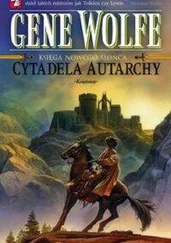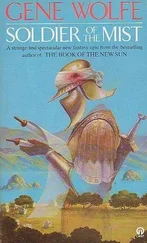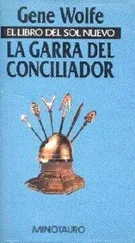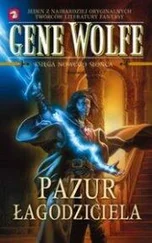Gene Wolfe - Soldier of Sidon
Здесь есть возможность читать онлайн «Gene Wolfe - Soldier of Sidon» весь текст электронной книги совершенно бесплатно (целиком полную версию без сокращений). В некоторых случаях можно слушать аудио, скачать через торрент в формате fb2 и присутствует краткое содержание. Жанр: Фэнтези, на английском языке. Описание произведения, (предисловие) а так же отзывы посетителей доступны на портале библиотеки ЛибКат.
- Название:Soldier of Sidon
- Автор:
- Жанр:
- Год:неизвестен
- ISBN:нет данных
- Рейтинг книги:3 / 5. Голосов: 1
-
Избранное:Добавить в избранное
- Отзывы:
-
Ваша оценка:
- 60
- 1
- 2
- 3
- 4
- 5
Soldier of Sidon: краткое содержание, описание и аннотация
Предлагаем к чтению аннотацию, описание, краткое содержание или предисловие (зависит от того, что написал сам автор книги «Soldier of Sidon»). Если вы не нашли необходимую информацию о книге — напишите в комментариях, мы постараемся отыскать её.
Soldier of Sidon — читать онлайн бесплатно полную книгу (весь текст) целиком
Ниже представлен текст книги, разбитый по страницам. Система сохранения места последней прочитанной страницы, позволяет с удобством читать онлайн бесплатно книгу «Soldier of Sidon», без необходимости каждый раз заново искать на чём Вы остановились. Поставьте закладку, и сможете в любой момент перейти на страницу, на которой закончили чтение.
Интервал:
Закладка:
The holiest place held the rude statue of a woman. From her left hand dangled such a cross as I know I have seen elsewhere, though I do not know where; her right held a long arrow. Her headdress was a disk, as of the sun or moon, held by curved supports.
Myt-ser'eu knelt to her, bent her head and prayed. Her whispers were too soft for me to make out the words, and I felt certain she was praying that she be returned to her city in the north.
The goddess stepped from her pedestal, becoming a living woman no larger than Myt-ser'eu herself-smaller, perhaps-but standing before a thing brighter than she. She held out her arrow to me; with the hand I freed by accepting it, she took the disk from her headdress and held it before Myt-ser'eu's eyes. "Your prayer for the man with you is granted," she told Myt-ser'eu. "You are to give him this. The wish you left unvoiced is granted as well. You shall return to your home as you desire, though you shall leave again by your desire."
Her arrow had melted into my hand the moment I grasped it. The disk she had shown Myt-ser'eu rang as it fell to the stones on which she stood, and at the sound there was no woman standing there, only the image of a woman standing upon its pedestal.
Myt-ser'eu straightened up and picked up a larger disk. "Look, Latro! A shield! We didn't see it because it lay flat on the floor, but here it is."
She held it out to me, and I took it. It is of bronze green with age. The handle on the back is bronze also. These small clipei have no strap for the arm. I have it before me as I write, and will polish it when I have written all I must.
When we returned to the upper level, I showed it to the king, who looked at it from every angle but would not touch it. When he had examined it in that fashion, he said that we must go, calling Mzee and Unguja to him. I was about to call my sons, when they ran to me trembling. Vinjari had seen a big snake, the younger said, and cast his spear at it. When the spear struck, it was a man.
I ran to look, making them come with me, though they were badly frightened. The man was my slave. His mouth was wide as he coughed blood, and I saw that he had fangs. I do not believe I can ever have seen a man with fangs before. I do not think anyone else saw these fangs.
I gave my spear and shield to Utundu, and picked up my slave. He died in my arms. I told the king we must bury him. He had belonged to me, and I owed him that and more. The king agreed.
My wives, my sons, my daughter, and our servant girl went with me into the bush. In the bed of the dry stream, in a place of many stones, we dug a grave with spears; but when we would have laid him in it, he was gone. I said that some animal must have carried the body away while we worked. The women and girls said it could not be. They had been sitting beside it a moment before, talking quietly among themselves and waving off the flies.
Perhaps they slept.
Or it may be that Vinjari took it, and they would not tell me. However that may be, he has gone off into the bush. Utundu and I tracked him a long way, but lost the trail at last. NOW I MUST write again. I have built up the fire, and there will be light enough for a time. I polished the new shield the goddess gave me while the others slept, rubbing it with fine sand to make it bright. Soon it was so clear in the place I rubbed that I could see the leaping flames behind me reflected there.
They vanished, and in their place I saw a self younger than I am whose head was wrapped in bloodstained bandages. This self threw his sword into the river, offering a prayer to the river god. The river god tempered it, heating it in flickering flames that rose from his waters and quenching it in them. At length he returned it, and nothing save my own shadow and the flickering flames showed in the bright metal over which I had labored.
But I remembered! I remember even now. Not just seeing it in the metal, but the whole event: How my head ached that day, and how weak I was. How I had prayed for the black man with me-he was the king, I know, for his face was the same.
He was my only friend, and the river god the only god I knew. I cast my sword into the river when I had asked the river god to bless him. The river god showed it to his daughters, beautiful young girls with skin as white as his, and his skin was as white as foam. When they had seen it and tried to take it from him, he returned it to me.
"Not wood, nor bronze, nor iron shall stand against her, and she will not fail you until you fail her."
I have failed her now, but I will redeem my failure. Or walk alone and sorrowing, as this says my son did, into the bush to die.
32
TOMORROW WE WILL go down the Great River. Last night I talked long with the king. I spoke as Hellenes do, he as his people do. I understand that speech better than I speak it.
He told me many things that had taken place while we were together in Hellas. They are fading from my mind even as I write. It may be well that they do, because there are many I cannot believe or may have misunderstood.
I told him of casting Falcata into the river, and he said I had told him of it before, long ago. I said that I must find her and hold her again, or die in the attempt. I had spoken of Falcata to my senior wife. (Myt-ser'eu is her name, and she is the smaller of the two.) She told me how I had lost it when I fought the men of Nubia. It must surely be somewhere in Nubia now, I told the king, for no soldier would cast aside such a weapon. I was going there to find it, I said; and I asked in the light of our friendship that he see that my wives and children did not want while I was away. He said he would, but soon said that he himself would go with me. He will bring warriors and gold, for it may be that we will have to buy back Falcata from her new owner. He will bring the queen as well; and when I have regained Falcata, we will journey north into Riverland and from there to her city. Unguja will govern for the king in his absence. We spoke with him, and he swore that he would see that my wives and children are well treated and have good food. AS SOON AS I could, I told Myt-ser'eu much of what the king and I had said. I do not recall it now-only the casting my sword into the river of Hellas-but when we spoke I did, and no doubt some are written here. She raged and wept and raged again. I swore, she said, that I would return her to her native city. She will have no gift from me, for I have become poor, her jewelry is gone, and now I intend to break my oath. She would take her own life-this she said again and again.
Then that she would take mine (though I do not fear her).
After that, that she would do both.
Weeping she spoke of all that we have been through together, of her faithful service and of the love she gave me without stinting.
I explained that I had sensed all those things, though I could not recall the events; and I told her what is very true-that she is first in my heart. Regaining Falcata may be dangerous indeed. The men she told me of, who had taken Falcata from me and enslaved us, were my foes. I might have to fight them again, and this time they might kill me.
She made me read the first part of this scroll, saying I would find my promise there. I read it. If I made such a promise, I did not record it. Yet her goddess had appeared to me, I had promised my protection, and the return of the singing girls was certainly implied in what the priest and the man with me had said. Further, it was implied that I would make Myt-ser'eu a suitable gift when we parted. As she said, I have none to give.
We spoke of this, and I read to her from this scroll, turning its speech into hers as I read. She asked again and again whether I had really spoken with her goddess. All that I could do was repeat that I did not know, that it was written as I had said.
Читать дальшеИнтервал:
Закладка:
Похожие книги на «Soldier of Sidon»
Представляем Вашему вниманию похожие книги на «Soldier of Sidon» списком для выбора. Мы отобрали схожую по названию и смыслу литературу в надежде предоставить читателям больше вариантов отыскать новые, интересные, ещё непрочитанные произведения.
Обсуждение, отзывы о книге «Soldier of Sidon» и просто собственные мнения читателей. Оставьте ваши комментарии, напишите, что Вы думаете о произведении, его смысле или главных героях. Укажите что конкретно понравилось, а что нет, и почему Вы так считаете.










